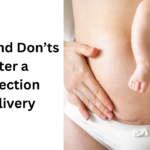After giving birth, understanding how your vagina feels after birth is crucial. It’s important to understand these postpartum changes and how to manage any discomfort or concerns during your recovery.
The vagina may appear wider and feel looser and more open after childbirth. This is due to the stretching that occurs during delivery to accommodate your baby. Additionally, you may experience bruising or swelling in the vaginal area. Vaginal dryness is also common, especially if you are breastfeeding.
During this time, it’s important to prioritize self-care and seek appropriate medical advice when needed. There are steps you can take to help tighten the vagina and prevent bladder problems, such as pelvic floor exercises like Kegels. It’s important to keep any stitches clean and manage pain or discomfort with ice packs and pain medication.
Remember that the postpartum period is a time for healing. Be patient with yourself and listen to your body as you navigate the changes in your vagina after birth.

Key Takeaways:
- After giving birth, it is common for the vagina to feel wider and looser.
- Bruising, swelling, and vaginal dryness are also common postpartum changes.
- Pelvic floor exercises like Kegels can help tighten the vagina and prevent bladder problems.
- Keeping any stitches clean and managing pain with ice packs and medication is important.
- Remember to prioritize self-care and listen to your body during the postpartum period.
Related: Flat Mom Butt: Get Your Pre-Baby Booty Back
How Your Vagina Feels After Birth?
After giving birth, it is normal for women to experience various changes in their vaginal area. Understanding these changes and knowing what to expect can help you navigate the postpartum period with ease.
During delivery, the vagina stretches to accommodate the baby’s head. This stretching can vary in degree, depending on factors such as the baby’s size, genetics, and previous deliveries. To prepare your vaginal area for childbirth, perineal massage and Kegel exercises during pregnancy can be beneficial.
After giving birth, it is common to feel soreness and discomfort in the vaginal area. You may also experience swelling and bruising. Vaginal discharge, known as lochia, is another common occurrence that can last for several weeks. It is important to remember that these changes are temporary and will gradually improve as your body heals.
Vaginal dryness is also common after childbirth, particularly while breastfeeding. However, this usually resolves once your hormone levels return to normal. It is important to stay hydrated and use a water-based lubricant if needed to alleviate any discomfort during intercourse.
| Changes to Your Vagina After Birth | Description |
|---|---|
| Vaginal Stretching | The vagina stretches during delivery to accommodate the baby’s head. |
| Perineal Massage | Perineal massage during pregnancy can help prepare the vaginal area for childbirth. |
| Soreness and Discomfort | After giving birth, it is common to feel soreness, discomfort, swelling, and bruising in the vaginal area. |
| Vaginal Discharge | Vaginal discharge, known as lochia, is normal after childbirth and can last for several weeks. |
| Vaginal Dryness | Vaginal dryness is common, especially while breastfeeding, but usually resolves as hormone levels normalize. |
Preparing for Postpartum Changes
To prepare for postpartum changes, consider incorporating perineal massage and Kegel exercises into your daily routine during pregnancy. Perineal massage can improve the elasticity of the vaginal tissues, while Kegel exercises strengthen the pelvic floor muscles, which can aid in postpartum recovery.
During the postpartum period, it is crucial to prioritize self-care. Rest as much as possible and avoid activities that can strain the vaginal area. Maintaining good hygiene, changing pads regularly, and keeping the stitches, if any, clean can help prevent infection and promote healing.
Remember that every woman’s postpartum experience is unique. If you have concerns or persistent discomfort, it is important to consult with your healthcare professional. They can provide guidance, offer additional tips for managing pain and discomfort, and address any specific concerns you may have.
Related: Bye-Bye C-Section Shelf: 2 Surprising Solutions
Managing Pain and Discomfort
After giving birth, it is common to experience pain and discomfort in the vaginal area, especially if an episiotomy or perineal tear occurred during delivery. These procedures may lead to soreness, burning, and general discomfort. Proper management of pain is crucial for a smoother postpartum recovery.
To alleviate pain and discomfort, there are several strategies you can employ. Firstly, over-the-counter pain medications, such as acetaminophen or ibuprofen, can help to relieve pain and reduce inflammation. It is important to consult with your healthcare provider before taking any medication, especially if you are breastfeeding.
Another effective method is using ice packs on the affected area. Applying an ice pack wrapped in a clean cloth for 10 to 20 minutes at a time can help reduce swelling and provide temporary relief. Just be sure to never place ice directly on the skin, as it can cause frostbite.
Postpartum Recovery Tips
Aside from pain relief strategies, there are other self-care practices that can aid in your postpartum recovery. Keeping the stitches, if you have any, clean is essential to prevent infection. Ensure you change your pads regularly and follow any specific wound care instructions given by your healthcare provider.
Sitting on a padded ring or cushion can also help alleviate pressure on the perineal area and reduce discomfort while sitting. A sitz bath, where you soak your bottom in warm water, can provide additional relief and promote healing.
If you experience persistent pain or have concerns about the healing process, it is important to reach out to your healthcare provider for further guidance. They can assess your situation and provide appropriate advice and treatment options to support your recovery.
| Pain Relief Option | Description |
|---|---|
| Over-the-counter pain medications | Acetaminophen or ibuprofen can help relieve pain and reduce inflammation. Consult with your healthcare provider for the most appropriate option. |
| Ice packs | Applying ice packs wrapped in a cloth can help reduce swelling and provide temporary relief. Always wrap the ice pack and never apply it directly to the skin. |
| Sitz bath | Soaking your bottom in warm water can provide relief and promote healing. Ensure the water is comfortably warm, but not hot. |
| Padded ring or cushion | Using a padded surface to sit on can help alleviate pressure on the perineal area and reduce discomfort while sitting. |
Related: What Are The Natural Cures For Female Dryness?
Sexual Changes and Intimacy After Birth
After giving birth, it is common for women to experience changes in their sexual function and intimacy. These changes can be attributed to factors such as vaginal stretching and hormonal fluctuations. Understanding and addressing these changes is crucial for maintaining a healthy and fulfilling sex life postpartum.
One common issue that women may encounter is painful sex . Vaginal stretching during childbirth can lead to discomfort or pain during intercourse. It is important to remember that this is a temporary issue and often improves with time and proper healing. Using a water-based lubricant can also help alleviate discomfort and enhance pleasure.
Vaginal dryness is another common concern. Hormonal changes, especially while breastfeeding, can cause a decrease in vaginal lubrication. Using a quality lubricant can help alleviate dryness and enhance comfort during sexual activity. It is important to note that vaginal dryness usually resolves once hormone levels return to normal.
Difficulty achieving orgasm and changes in libido are also common after giving birth. It is important to be patient with yourself and your body as you navigate these changes. Open and honest communication with your partner can help ensure both of your needs are met. If you have any concerns or persistent issues, consulting a healthcare professional may provide additional guidance and support.

Summary:
- Painful sex can be caused by vaginal stretching during childbirth but usually improves with time and proper healing.
- Vaginal dryness is common due to hormonal changes and can be managed with lubricants.
- Difficulty achieving orgasm and changes in libido are normal after giving birth and can be addressed through open communication with your partner.
Related: How Do Celebrities Lose Weight Fast After Pregnancy?
Conclusion
The postpartum period is a time of significant physical changes, including changes to the vagina. It is important to approach this period with patience, proper self-care, and open communication with both your healthcare professional and partner.
Understanding the common changes that occur, such as vaginal stretching and hormonal fluctuations, is key to navigating the postpartum recovery process. Remember to prioritize your own self-care during this time, taking into consideration the healing needs of your body.
Managing any pain or discomfort that may arise is crucial. Seek appropriate medical advice when needed and discuss any concerns or persistent pain with your healthcare professional. They can provide valuable guidance and support to help ensure a smooth postpartum recovery.
As you embark on this journey of healing and adjustment, remember to listen to your body. Each person’s postpartum experience is unique, and it is important to give yourself the time and space for self-care, while also enjoying the precious moments with your new baby. Congratulations on your beautiful journey of motherhood!
Related: How To Get Rid Of Linea Nigra? Full Guide
Frequently Asked Questions (FAQs)
What changes can I expect in my vagina after giving birth?
After giving birth, it is common for the vagina to appear wider and feel looser and more open. It may also feel bruised or swollen.
Is vaginal dryness common after giving birth?
Yes, vaginal dryness is common, especially for those who are breastfeeding. However, it should improve once hormone levels return to normal.
How can I tighten my vagina after childbirth?
Pelvic floor exercises, such as Kegels, can help tighten the vagina and prevent bladder problems.
What can I do to manage pain or discomfort in my vaginal area?
Managing pain and discomfort can be done through the use of ice packs, over-the-counter pain medication, and sitting on a padded ring. It is also important to keep any stitches clean, if applicable.
Is it normal to experience difficulty with urination and bowel movements after giving birth?
Yes, it is normal to experience some difficulty with urination and bowel movements after giving birth. These issues usually resolve with time.
How long does vaginal discharge, known as lochia, last after giving birth?
Lochia can last for several weeks after giving birth. It is a normal part of the postpartum healing process.
Will my vagina return to its pre-pregnancy appearance?
Yes, temporary changes in the appearance of the vagina, such as looking wider or swollen, typically resolve within a few weeks after giving birth.
What should I do if I had an episiotomy or perineal tear during delivery?
If you had an episiotomy or perineal tear, it is important to manage pain and discomfort with over-the-counter pain medication, ice packs, and sitting on a padded ring. Keeping the stitches clean and changing pads regularly can help prevent infection.
Will sex be painful after giving birth?
Vaginal stretching and hormonal changes can cause pain or discomfort during sex after giving birth. However, this usually improves with time and proper healing.
What can I do if I experience changes in libido or difficulty achieving orgasm after giving birth?
Changes in libido and difficulty achieving orgasm are common after giving birth. Communication with a partner and patience are key in navigating these changes. If concerns persist, it is important to consult a healthcare professional.
How long does it take to recover from the changes in my vagina after giving birth?
The postpartum period is a time for healing, and it is important to prioritize self-care. Recovery time can vary, but it is advisable to listen to your body and seek appropriate medical advice if needed.
Source Links
- https://www.nct.org.uk/labour-birth/you-after-birth/your-vagina-and-pelvic-floor-after-giving-birth
- https://www.whattoexpect.com/first-year/vagina-after-birth/
- https://www.medicalnewstoday.com/articles/vagina-after-giving-birth












